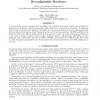Free Online Productivity Tools
i2Speak
i2Symbol
i2OCR
iTex2Img
iWeb2Print
iWeb2Shot
i2Type
iPdf2Split
iPdf2Merge
i2Bopomofo
i2Arabic
i2Style
i2Image
i2PDF
iLatex2Rtf
Sci2ools
115
click to vote
CHES
2006
Springer
2006
Springer
Implementing the Elliptic Curve Method of Factoring in Reconfigurable Hardware
A novel portable hardware architecture of the Elliptic Curve Method of factoring, designed and optimized for application in the relation collection step of the Number Field Sieve, is described and analyzed. A comparison with an earlier proof-of-concept design by Pelzl, Simka, et al. has been performed, and a substantial improvement has been demonstrated in terms of both the execution time and the area-time product. The ECM architecture has been ported across five different families of FPGA devices in order to select the family with the best performance to cost ratio. A timing comparison with the highly optimized software implementation, GMP-ECM, has been performed. Our results indicate that low-cost families of FPGAs, such as Spartan-3 and Spartan-3E, offer at least an order of magnitude improvement over the same generation of microprocessors in terms of the performance to cost ratio.
CHES 2006 | Cryptology | Earlier Proof-of-concept Design | Elliptic Curve Method | Number Field Sieve |
Related Content
| Added | 20 Aug 2010 |
| Updated | 20 Aug 2010 |
| Type | Conference |
| Year | 2006 |
| Where | CHES |
| Authors | Kris Gaj, Soonhak Kwon, Patrick Baier, Paul Kohlbrenner, Hoang Le, Mohammed Khaleeluddin, Ramakrishna Bachimanchi |
Comments (0)

